

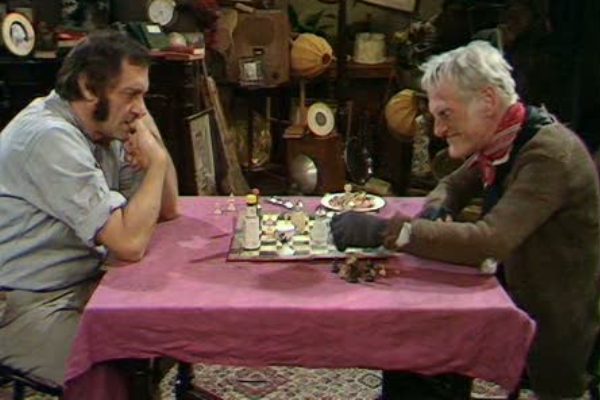
The first series to contain existing colour episodes, with Come Dancing and Cuckoo In The Nest surviving in the format. Some of the last episodes in this run strain credulity - the single-joke plot of Pot Black expects viewers to believe obviously pre-recorded inserts on film stock are Harold and his father playing snooker, while The Three Feathers has a totally unconvincing "stuck Yoga position", and not much for those who don't find laughs out of the word "po".
But for all the weak patches, there are some fine moments here, a series that very often sticks to the original "two men alone" musings before series seven changed the format entirely. Tea For Two most notably begins with an extended, twelve-minute conversation between the two men over opposing typewriters. This was arguably the last time we'd fully glimpse the programme's Beckett-style musings, although it is notable that the two men are now relatively affluent all series, the reflections on poverty not as stated.
Best Episode: Two's Company
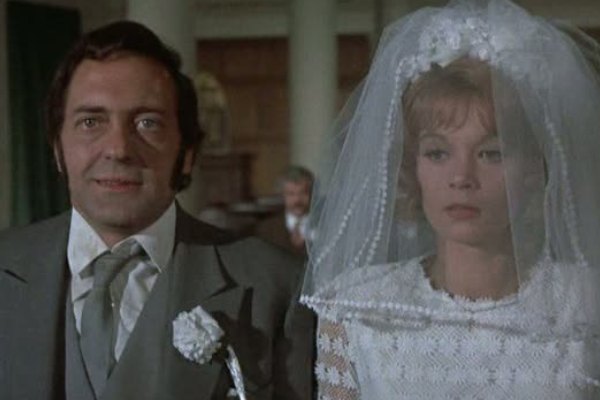
The very successful attempt to translate the programme to film, with the venture reportedly earning back six times its budget. The move to cinema and the absence of a studio audience produces scaled-back performances from both leads in a film which manages to be one of the bleakest instalments produced. Harold is the most neutered and psychologically scarred he's ever been, and, with almost no exceptions, every person they meet is a morally bankrupt individual. This is a film with none of the warmth of the lighter television episodes, as the stars are transplanted into real locations, set in a pitiless, poverty-stricken London locale.
As a feature film based on a sitcom, then there's the obligatory "transplant the regulars to a cheap set pretending to be Spain" shenanigans that all sitcoms of the period seemed to feel was necessary. But not only does this segment last briefly, it becomes vital to the story. Elements of the plot and even some lines are familiar from the previous ten years of the programme, though Galton and Simpson do manage to create some notable new insults, such as Harold's observation as his wicked-tongued father recovers from food poisoning: "That wasn't a lobster that poisoned you, you swallowed your own venom."
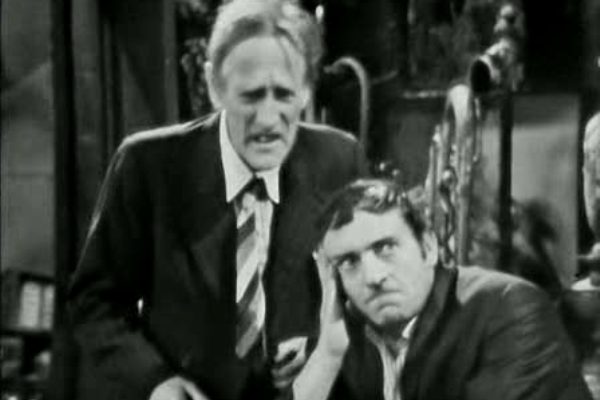
Airing twenty months after series three, the lengthy production break had seen Brambell state that he wanted to move on, and appeared in, amongst other things, a flop Broadway show and a role in A Hard Day's Night.
The least of the 60s series, there are weaker episodes here than before, and coarser, broader content.
However, the first-rate series closer ably showcases Galton and Simpson's flair for dialogue and social commentary: "It wasn't your fault, you didn't stand a chance. They got me an' all in the next lot. I went just like you, just as young, just as gullible. I was gonna come back to a new world, too. I'm still living in the same house they were gonna chop down after your lot. But never mind. It won't happen in the next war. 'Cos when all them people comes crawling out of their atomic shelters, they're gonna have to build their own bleedin' houses."
Best Episode: Pilgrim's Progress
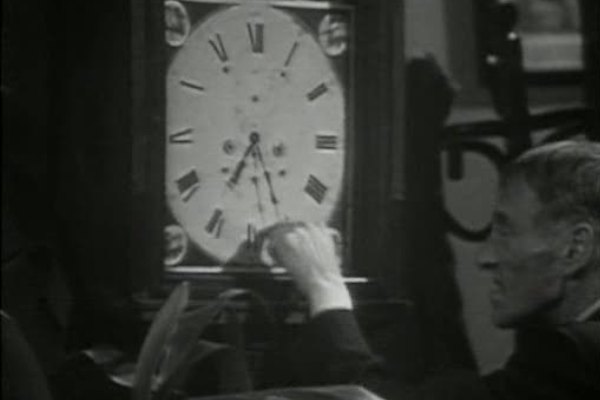
There's a hair's breadth between the first three series of Steptoe and Son in terms of quality. The first is one for purists, following on from the Comedy Playhouse episode by showing a more sinister, manipulative side to Albert. The first episode (or second, when the unintended pilot was broadcast before it) sees him deliberately goad Harold into losing his temper with a potential lover, doing everything in his power to ensure his son will stay with him. Character progression was still a factor of these earlier series, and Harold makes frequent reference to wanting to escape, someway removed from the later character who accepted being forever part of his dad's life. The bittersweet series closer, The Holiday, also adds a poignant touch.
Yet what keeps the first series in fourth place are clear signs that Galton and Simpson weren't initially sure where to take the programme. The three middle episodes vary in tone and characterisation, the two writers only having thought of "Steptoe and Son" as a single, one-off play before being encouraged to develop it into a full series. It's this slight uncertainty and varying in quality that keeps the first series slightly below the two that followed...
Best Episode: The Bird
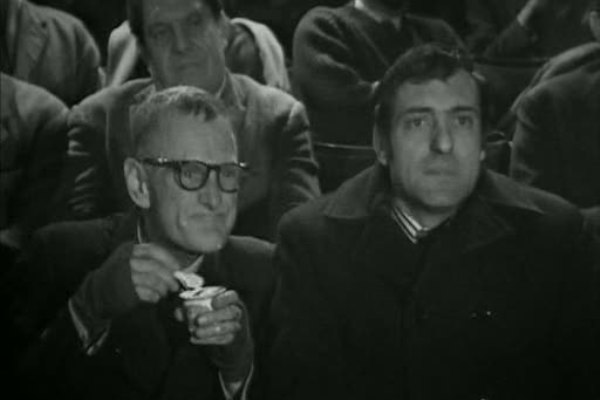
The commercial peak of the programme, with the series finale the most-watched episode of 1964 with over 21 million viewers. This success is perhaps reflected in the content, which has a greater confidence and assuredness than before, and is also ruder: we get photographs of bare breasts, as well as the use of language like "slags", and the memorable phrase "I'm colder than a penguin's chuff".
One element of the series that may shock today is its use of bigoted language in the name of satire. Pre-dating Alf Garnett by eighteen months, Albert Steptoe discusses "wogs" so often in The Lodger that the word appears no less than eight times in the episode. A homosexual in real life, Brambell's tirades about "great fairies" are also along the same lines.
Later episodes of the programme did use such terms and attitudes for broader laughs, muddying the issue over whether it was intended as satire of not. However, for 1964 the series was a programme so assured both in itself and in its audience that it could not only pull off such satire effortlessly, but it could base an entire episode around a Fellini movie without worrying about it being esoteric.
Best Episode: Sunday for Seven Days
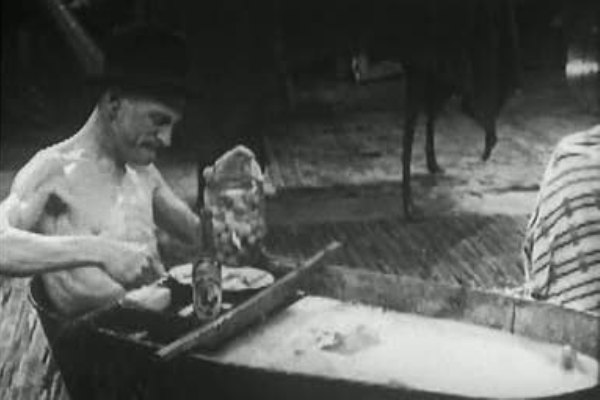
The strong second series that would see the two stars invited onto that year's Royal Variety Performance. Here we get arguably the series' most iconic moment, where Albert bathes with a pickle jar, and the term "you dirty old man" is no longer a line of dialogue, but now a catchphrase.
The seven episodes, with not a bad one in the bunch, range from pathos to OTT comic violence. Yet there are still dark moments, such as Harold seriously contemplating smothering his dad, or suggesting a suicide pact. An episode where Albert plans to remarry produces some particularly uncomfortable moments, with blistering resentment from Harold and a comic centrepiece where he physically assaults his dad for laughs.
However, most notable is that it contains the first purely "warm" episode, Full House, where Albert uses his guile to help his son get back money from card sharks. The episode ends with the two sharing laughs, while the following episode sees Albert remark that his son has now given up on his earlier ambitions at leaving the family home. Suddenly the format, for better or worse, is now cemented.
Best Episode: Is That Your Horse Outside?
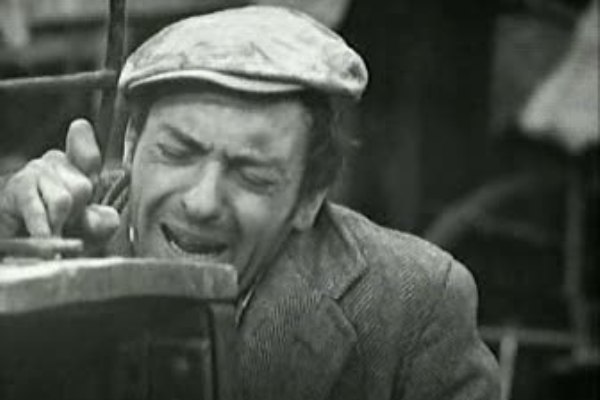
Steptoe and Son's finest half hour, featuring as a one-off episode in the BBC's then-new anthology series Comedy Playhouse. Newspaper discussion compared it to the likes of Chekov, and while all ten Playhouse episodes were written by Ray Galton and Alan Simpson, it was only the bleak, strikingly different Steptoe and Son which was seen by the BBC Head of Comedy as worthy of a series. Despite Galton and Simpson's reservations, the first series aired five months later.
It's tempting to wonder what heights Steptoe and Son could have reached if it had followed the logical progression of The Offer rather than enter more traditional sitcom fare, increasingly so as the years went on. While that's not to say that the 56 episodes that followed were a let down – far from it – this unintended pilot is in a class of its own. Featuring genuine actors instead of comedians and depicting working class, poverty-striken life, this is kitchen sink (or junkyard) drama, softened with a few humorous moments rather than a full on comedy, the end more likely to produce tears than laughter.